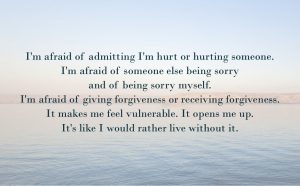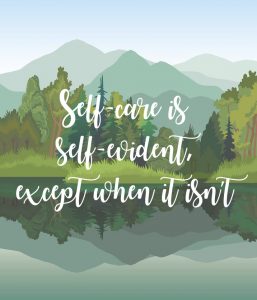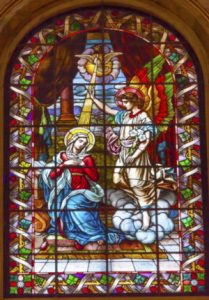Worry and the Value of Practice
What do you fear? For some it may be close to the surface and easy to name. Others may have to think a little harder.
Having trouble with that? Let me prime the pump a bit: spiders, snakes, the dark, being alone, a certain person, your boss, your parents, your kids, the future, the Democrats, the Republicans, losing something, never finding something, not making a difference, not leaving a legacy, terrorism, terrorists, violent people, sickness, getting old, losing your ability to think clearly, losing your health and mobility, losing independence, losing yourself, people very different from you, not having enough money, losing your job or the money you do have, losing someone you love, getting hurt, guns, flying, water. (Now aren’t you glad you are reading this post!?)
alone, a certain person, your boss, your parents, your kids, the future, the Democrats, the Republicans, losing something, never finding something, not making a difference, not leaving a legacy, terrorism, terrorists, violent people, sickness, getting old, losing your ability to think clearly, losing your health and mobility, losing independence, losing yourself, people very different from you, not having enough money, losing your job or the money you do have, losing someone you love, getting hurt, guns, flying, water. (Now aren’t you glad you are reading this post!?)
What do you fear? Related to that, what makes you worry?
Psalm 27 contains a similarly long list of fears and worries:
- Evildoers who came to devour my flesh, my adversaries and enemies (v. 2)
- A host (army) encamped against me, war raised against me (v. 3)
- A “day of trouble” (v. 5)
- Enemies around me (v. 6)
- God hiding His face, turning away in anger, abandoning/forsaking me (v. 9)
- Adversaries, false witnesses, violent people (v. 12)
- I would have despaired (v. 13)
If you read all of Psalm 27, you’ll see that these fears are mixed in the middle of faithful prayer, seeking, and trusting God. That tells me that worry is part of life, even a faith-filled life.
What Shall We Do With Our Fears?
By itself, of course, fear is not an unhealthy thing. It is the appropriate reaction – often instinctively – to danger, and in some contexts it can save our lives. The real problem comes when fear turns to worry and anxiety. Our fears themselves can become the adversary and enemy, taking on a life of their own. They can become our gods, that which directs our path, choices, and behavior. Our fears can enslave us, stealing our freedom, joy, and purpose. So what shall we do with our fears? Psalm 27 offers several patterns of belief and behavior, habits that can only be ingrained over time and practice.
Confidence in the Lord (vv. 1-3) Confidence seems like a strange place to start, and it is. Confidence is typically the fruit of belief and behavior made habit, not the starting place. But this is poetry and the Psalmist isn’t teaching a lesson, but describing life. Consider it an upfront description of the hope and courage this Psalmist has found in the face of serious challenges. Too often we plug something or someone other than God into the lines: ______ is my light and salvation; _____ is the defense of my life. And if we put lesser things or people as our light, salvation, and defense, is there any wonder our confidence is shaky?
Seeking God’s Presence (vv. 4-10) In verses 4-10, the writer describes “one thing I shall ask and seek,” which is to know God. This is a person who is choosing to cultivate faith and behaviors that look for God. You can read in these words the patterns of worship, offering, singing, praying, and praising. Though we want to focus on why we struggle, it is more important to focus on who God is. You can clearly see that in the writer’s words; we can never go wrong praying for God to show Himself to us!
Learning While We Wait (vv. 11-14) I appreciate the reality of this Psalm: God isn’t waiting at the drive-thru window to immediately dispense whatever we have ordered up in prayer. Seeing and experiencing God is relational, not unlike cultivating relationships with people, which also take time and often involve some waiting and seeking. Meanwhile, the writer cultivates more habits of faith and behavior. His exhortation “teach me your way” (v. 11) recognizes the need to learn about God and God’s will, while the command to “wait for the Lord” (v. 11) recognizes the discipline of cultivating a relationship, even if it’s with a holy God.
A Picture of Confidence
If someone asked you to stand up and sing in front of a group of people, would you do it? Some might, but for many, it would not be their choice of a good time. If someone asked me to sing a song or play an instrument at a party, I would not be afraid. Yet there was a time when playing the piano or singing in public terrified me. I remember sitting at many piano recitals with my hands shaking and my heart pounding as it got closer to my time to play.
Do you know what has changed? It’s not talent or natural ability. It is the pattern and habit of practice. It is playing scales and learning chords and notes and actually doing it over and over again until the unknown is mostly removed. Those patterns and habits of behavior (and belief) were like bricks, slowly building a foundation of confidence. I also very clearly know what I can’t do, what is beyond me. I might tell you, “I can play that song” or “I can’t play that song,” and I would be confident in my answer, because it is strengthened by years of habit and practice and action.
That analogy isn’t perfect because the Psalmist doesn’t ultimately advocate that we build up a foundation that trusts in our own strength. But it does help describe the net effect of seeking God and making worship part of everyday life. Those things build up a foundational relationship with God that we can lean into when we need it. The power of those things is not in us, but in knowing God more deeply. It is the reason I think this Psalmist, who is in the midst of so much opposition that could rightly cause fear and anxiety, does not despair. He has habit and history and knowledge of God. And it is never too late to start building those habits, building the kind of faith and knowledge that can say:
“The Lord is my light and my salvation; whom shall I fear?
The Lord is the defense of my life; whom shall I dread?”
The Rev. Dr. Robert Austell has served as pastor of Good Shepherd Presbyterian Church in Charlotte, NC, since 2002. Check out his writing and links to other endeavors at his blog (robertaustell.blogspot.com).








